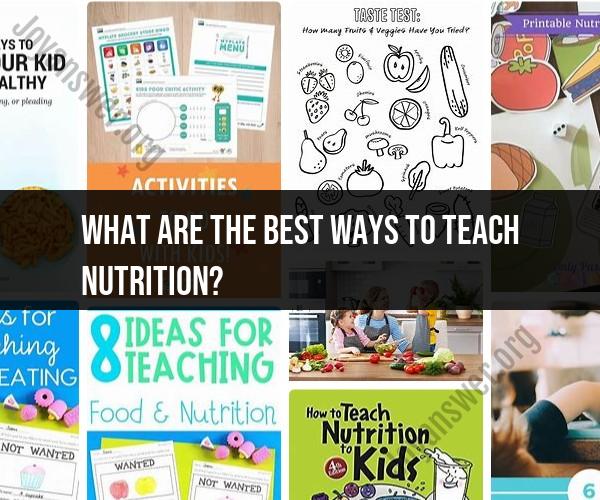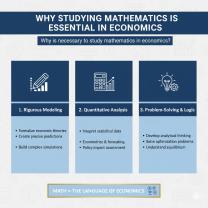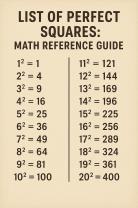What are the best ways to teach nutrition?
Teaching nutrition effectively to students, whether in a classroom or other educational settings, is crucial for promoting healthy eating habits and overall well-being. Here are some strategies that educators can use to teach nutrition effectively:
Make It Age-Appropriate: Tailor your nutrition education materials and lessons to the age and developmental level of your students. Younger children may benefit from interactive games and activities, while older students can engage in more in-depth discussions and analysis.
Use Visual Aids: Visual aids like charts, posters, and diagrams can help make complex nutritional concepts more understandable. Visuals can illustrate portion sizes, the food pyramid, and the nutritional content of various foods.
Hands-On Learning: Encourage hands-on learning by involving students in meal preparation or gardening projects. Growing their own vegetables or cooking healthy recipes can make nutrition education more practical and memorable.
Promote Critical Thinking: Encourage students to think critically about the foods they eat. Ask questions that prompt them to consider the nutritional value of their choices, such as "What nutrients are in this food, and how do they benefit your body?"
Real-Life Applications: Connect nutrition to real-life situations. Discuss the impact of food choices on health, energy levels, and performance in school or sports. Show how nutrition is relevant to everyday life.
Engage in Discussions: Create a safe and open environment for students to ask questions and share their thoughts and experiences related to nutrition. Encourage class discussions about healthy eating habits and their challenges.
Guest Speakers: Invite nutritionists, dietitians, or local chefs to speak to students. They can share their expertise and provide practical tips for making nutritious food choices.
Use Technology: Incorporate technology, such as educational websites, interactive apps, and videos, to make nutrition education more engaging. Many interactive resources are available to help students learn about healthy eating.
Interactive Games: Use educational games and activities to teach nutrition concepts. Board games, online quizzes, and interactive simulations can make learning fun.
Field Trips: Organize field trips to local farms, farmers' markets, or food production facilities to give students a firsthand look at where food comes from and how it's produced.
Encourage Food Journals: Have students keep food journals or diaries to track their food intake for a few days. This can help them become more aware of their eating habits and identify areas for improvement.
Incorporate Cultural Diversity: Celebrate cultural diversity by exploring and tasting foods from different cultures. This can foster an appreciation for a wide variety of nutritious foods.
Role Modeling: Be a positive role model by making healthy food choices and demonstrating a balanced approach to eating. Your actions can have a significant influence on students.
Assessment and Evaluation: Assess students' understanding of nutrition through quizzes, projects, and presentations. Provide constructive feedback to help them improve their knowledge and habits.
Parent Involvement: Engage parents and caregivers in nutrition education efforts. Send home newsletters or host family nutrition nights to involve families in reinforcing healthy eating habits.
Effective nutrition education is a lifelong skill that can have a lasting impact on students' health and well-being. By using a combination of these strategies and adapting them to your specific educational context, you can help students develop a strong foundation in nutrition knowledge and make informed choices about their diet.
Teaching Nutrition: Effective Strategies for Imparting Vital Knowledge
Teaching nutrition to kids is important for their overall health and well-being. A well-balanced diet can help kids grow and develop properly, maintain a healthy weight, and reduce their risk of chronic diseases later in life.
Here are some effective strategies for imparting vital nutrition knowledge to kids:
- Make it fun and engaging. Kids are more likely to learn and retain information if it is presented in a fun and engaging way. Use games, activities, and stories to teach kids about nutrition.
- Be a role model. Kids learn by watching the adults in their lives. If you eat healthy foods, your children are more likely to do the same.
- Make nutrition education relevant to their lives. Help kids to understand how nutrition can impact their energy levels, mood, and overall health.
- Focus on positive reinforcement. Praise kids for making healthy choices and avoid negative feedback.
Nurturing Young Minds: Best Practices in Nutrition Education
Here are some best practices in nutrition education for kids:
- Start early. The earlier you start teaching kids about nutrition, the more likely they are to develop healthy eating habits that will last a lifetime.
- Be consistent. Nutrition education should be an ongoing process, not just a one-time event.
- Tailor your approach to the child's age and developmental stage. Younger children may need more concrete examples and hands-on activities, while older children may be able to handle more abstract concepts.
- Involve parents and caregivers. Parents and caregivers play a vital role in shaping children's eating habits. Encourage them to support your nutrition education efforts at home.
Empowering Kids with Nutrition Knowledge: Successful Teaching Approaches
Here are some successful teaching approaches for empowering kids with nutrition knowledge:
- Use hands-on activities. Hands-on activities are a great way to help kids learn about nutrition. For example, you could have kids plant a garden, cook a healthy meal, or create a food model.
- Use real-world examples. When teaching kids about nutrition, use real-world examples that they can relate to. For example, you could talk about how the foods they eat at school or home affect their energy levels and performance.
- Make it interactive. Encourage kids to ask questions and share their own ideas about nutrition. This will help them to feel engaged and invested in the learning process.
- Provide opportunities for practice. Give kids opportunities to practice what they have learned about nutrition. For example, you could have them plan their own meals or snacks, or create a healthy recipe book.
By following these tips, you can help kids to develop a strong foundation in nutrition knowledge. This knowledge will empower them to make healthy food choices throughout their lives.












